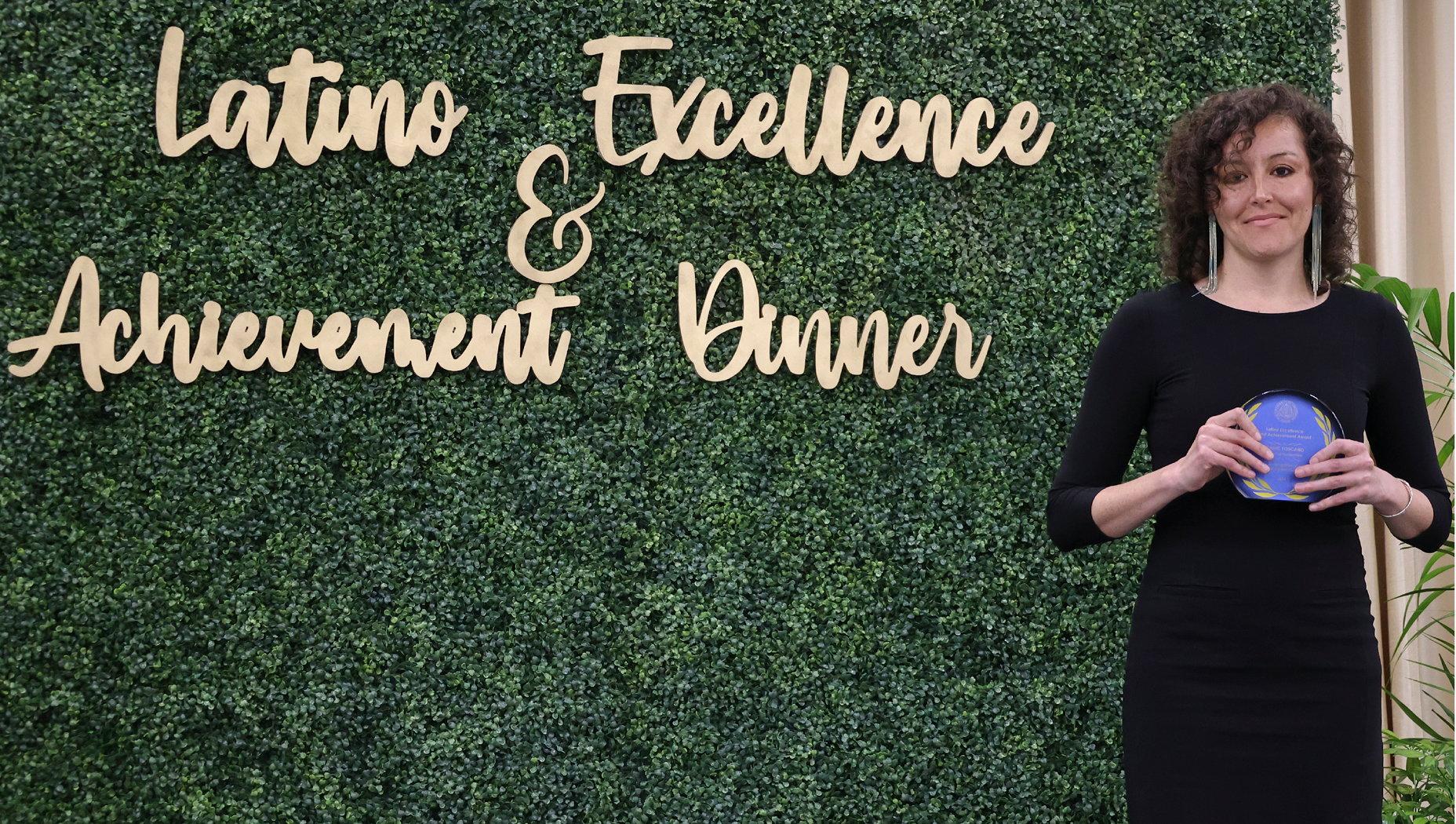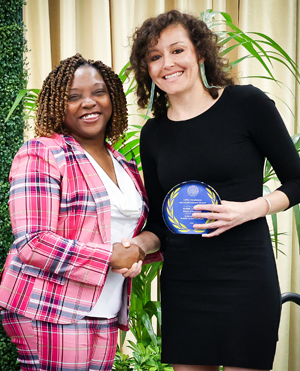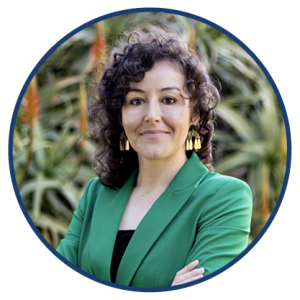
By Nikki Babri
Coming of age in a culture that viewed four-year degrees as unnecessary for women, Jeanie Toscano’s scholarly story is defined by challenging expectations and breaking barriers.
Toscano, a Ph.D. candidate in the Department of Spanish and Portuguese at UC Irvine set to graduate this summer, is the recipient of the 2024 Latino Excellence and Achievement Award (LEAD) in Graduate Student Excellence. For Toscano, receiving the LEAD Award symbolizes resilience, determination and the power of collective support in academia.
“Receiving this award is a chance for reflection. For those who have had to fight for every crack in the door to open just long enough to sneak in, this award is really a testament to that effort,” she says. “It is a testament to this intellectual community and to the Spanish and Portuguese department who opened its doors to me.”
Approaching the unknown
Born in Culiacán, Sinaloa, México, Toscano's upbringing was deeply influenced by her heritage and the complexities of navigating two cultures. Toscano’s father, a migrant worker from Sinaloa, and her mother, a California native and English teacher, met in an English class for migrant farm workers. Despite a host of obstacles, including her father's deportation, they persevered, leading her mother to move to Culiacán where she had 10 children before the family relocated to Oregon for better opportunities.
In a family where women were actively discouraged from higher education, Toscano was the first among her sisters to earn her bachelor’s degree. “My older sister had been admitted to a local university with a scholarship, but instead she enrolled in a two-year college, jokingly calling it a degree in ‘MMC’ – 'Mientras Me Caso,' or 'While I Marry,” she explains. “We were always taught that our intellectual pursuits should take a back seat to our duty to become someone's wife and mother.”

Challenging societal and familial norms, she graduated from the University of Portland with a degree in social work and German – a nod to her mother’s German ancestry. Because she was raised in a working-class family, Toscano was expected to pursue a practical career and initially chose social work to help immigrant and refugee families. Unexpectedly, her Fulbright Fellowship experience in Germany ignited a newfound passion for intellectual inquiry, prompting her to reconsider her career trajectory.
“I could not help the gnawing awareness that, as a social worker, I was simply a pothole fixer, never able to ask the bigger questions of what brought us to this present moment of widespread poverty, refugee crises, exploited migrant labor and the violence of the illicit drug trade. I felt intellectually limited, as though my critical mind was a liability wherever I went,” she says.
Toscano’s journey to graduate school was deeply influenced by her late mentor, Dr. Kate Regan, a Spanish literature professor who helped Toscano realize her skillset and vision could be applied toward inquiry. Regan, Toscano shares, had been the only person who recognized and encouraged her intellectual engagement with the world.
After Regan’s passing, Toscano realized her Spanish literature courses provided her with a profound connection to her heritage and identity. She decided to break traditional expectations and follow an academic path that once seemed unattainable. “It’s hard to emphasize how far beyond the reach of my imagination graduate school ever was. In my inner, unconscious core as a queer woman of color, time and time again I found myself excluded from broader social designs. I didn’t fit,” she emphasizes. “There did not seem to be much of a place for me in working class and professional America. Those Spanish literature courses were really the very first time I had ever felt a profound connection to literature since I had arrived in the U.S.”
Close to home
Toscano’s research examines the aesthetics of narcoviolence in contemporary Mexican narratives, focusing on ‘narcocorridos’ (narrative ballads about drug trafficking) and ‘narcoliterature’ (novels about drug trafficking). Grounded in her personal background and upbringing in Culiacán – nicknamed the ‘capital of drug trafficking’ – her work explores the contradictions and complexities inherent in these genres. Her dissertation examines how these narratives express dissent, disenchantment and collective longings for empowerment within our contemporary society.
“My research is a reflection of my lived experiences. Through my work, I aim to challenge dominant narratives and elevate the voices of those often silenced by systemic inequalities,” Toscano explains. She argues that ‘narcocorridos’, rooted in folk traditions, serve as vehicles for identity formation and conscience building among marginalized communities, while ‘narcoliterature,’ often associated with influential or educated segments of society, offers a platform for engagement with contemporary socio-political issues. Her research on narcoviolence and gender dynamics offers new insights into Mexican culture, connecting well-known literary works with lesser-studied popular music and cultural productions.
Creating Latinx safe spaces
Motivated by her own experiences of discrimination in academia, she co-founded Académiques Latinxs, a multilingual peer-mentoring support network for Latinx and non-Latinx graduate students and alumni. The interdisciplinary group welcomes scholars from all fields whose research explores Latin America and Latinx cultures or issues. Distinguishing the group, English, Spanish and Spanglish are used interchangeably as vehicles for thought and expression, creating a space for students to communicate authentically.
“It is so inspiring to be in the company of so many gifted minds who share similar social struggles rooted in our shared identities as Latinx graduate students. Success is contagious,” Toscano says.
In addition to her community-building efforts, Toscano mentors and supports both graduate and undergraduate students through various UCI campus initiatives. She has been a passionate advocate for inclusion, serving as a DECADE (Diverse Educational Community and Doctoral Experience) Representative, DTEI (Division of Teaching Excellence and Innovation) Pedagogical Fellow and Graduate Peer Mentor.
Through the Chicanx Latinx Staff Association, Toscano provided mentorship to first-generation Latinx undergraduates, guiding them through graduate school applications and funding processes. She also helped launch UCI's inaugural Spanglish Creative Writing Contest for undergraduate students, which celebrates linguistic innovation and hybridity within Latinx identities (and is a project she wishes had been available during her own undergraduate years).
Department support
From Toscano’s time at UCI, she’s received the Fletcher Jones Foundation Fellowship, Graduate Completion Fellowship and UC Regents Fellowship. Viviane Mahieux, associate professor and chair of Spanish and Portuguese, applauds Toscano's significant contributions to Latinx scholars during her time as a graduate student.
“Jeanie is an extremely committed member of our department and has demonstrated an unwavering commitment to equity and inclusion. She’s also taken advantage of every opportunity to further her pedagogical skills,” Mahieux says, referencing Toscano’s active participation in mentoring initiatives on campus and constant desire to support her peers. Mahieux adds, “She is also a published poet who is very active in Latinx creative writing communities within and beyond campus.”

For Toscano, poetry is a break from the rigid structures and demands of academia. It serves as a powerful tool to give voice to marginalized experiences and allow the unconscious to surface. Through her poetry, she confronts themes of silence, her fraught relationship with language and childhood trauma. This liberating outlet, she says, offers a way for her to confront and transcend experiences that silenced her.
Toscano envisions a future as a professor of Spanish and Latinx Cultures and Literatures, continuing to publish poetry and engage in public-facing scholarship. For her, teaching is a passion: “Teaching makes me feel alive. I believe Latinx students in the U.S. have the same right to study their own language and ideological heritage as do native English speakers who pursue studies in English literature. For all other students, Spanish opens the door to new ways of interpreting and engaging with the world. I want to be part of this process of guiding students as they expand their linguistic, cultural and intellectual horizons.”
Interested in reading more from the School of Humanities? Sign up for our monthly newsletter.
